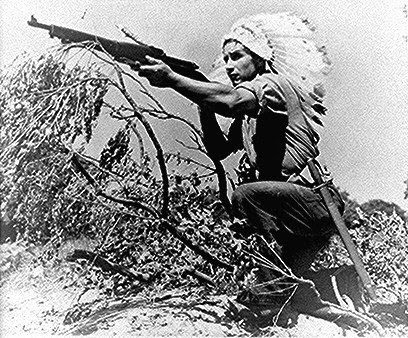Indian raid prompts request for soldiers
In September 1870, Lewis D. Brown wrote from Rancho San Felipe in Duval County to Texas Adjutant General Col. James Davidson of a raid by Indians in the county. The newspaper Nueces Valley published the letter in hopes of advancing the idea that the government would assign a company of soldiers to the area, perhaps at Fort Ewell.
Brown reported that on the morning of September 25 “a party of Indians, supposed to be Kickapoos from Mexico, killed Thomas Springfield and his wife, carried off two little boys of his and left wounded a little daughter at his ranch four leagues from here on the Nueces River. . . ”
The Indians, wrote Brown, killed Springfield and his wife about 100 yards from their ranch and stole all their horse stock, about 90 head. They then set out “on the road to the Presto towards Mexico.” The attack was a complete surprise to area residents.
Brown noted that a month earlier another band of Indians, which he believed were from the same tribe, had come into the neighborhood near Fort Ewell and “killed four or five persons and stole a large amount of horse stock.”
Brown lived in Corpus Christi and owned a sheep ranch in Duval County. He learned about these attacks while he visited the ranch to oversee the shearing of his sheep. Several of the people that had escaped harm from the Indians had come to his ranch seeking refuge. Brown asked Col. Davidson to advise the governor to think about stationing “one of his frontier companies near Fort Ewell or neighborhood.”
“Unless some steps are taken to prevent these raids of Indians, life and property in exposed ranchos, will become entirely unsafe in this section,” Brown wrote.
Still, not everything was bad in Duval County. Brown also informed the Nueces Valley that his sheep had yielded a better clip than usual; that range conditions were excellent and all types of stock was doing well.
N. G. Collins had opened a general merchandise store in San Diego and invited one an all wishing to buy hides, wool, sheep, mutton, horses, mares and other livestock to give him a call. Collins, a Republican, was also involved in the politics of the area, winning election to Precinct # 3. The newspaper did not mention what position he won but he defeated an opponent named Gravis, 107 to 87.
Diego Garza, however, was not doing as well. Attorneys Lovenskoad and McCampbell advertised in the Nueces Valley that they would sell at public auction at San Diego Rancho, in front of Collins’ store, 2,500 head of sheep and 1,000 head of goats. The attorneys called the sale in order to satisfy a promissory note Garza owed to Alfred Moses. The parties executed the note on June 13, 1869. The sale hoped to settle the balance of “$851.60 in Mexican silver dollars, less $200 paid August, 1870, together with interest and all costs in this act extended.”




Comments
Post a Comment
We welcome constructive comments and invite you to share your own research if you would like. Thank you.